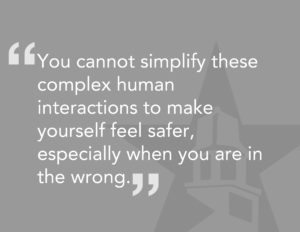There is something inherently human about an apology. The ability to feel remorse for an action and then to take blame for what has been done cannot be found in any other living organism. Humans are naturally empathetic creatures. It is good for us to practice apologizing because it builds empathy within us, making us more and more human with each wrongdoing.
 As beautiful as I’d like to think apologies are, they make us vulnerable to critique. No one likes critique. We like to hear about our successes and how we’ve made a positive difference in someone’s life. Criticisms never portray us in the best light. They point out the ever-present knowledge that we are not always right.
As beautiful as I’d like to think apologies are, they make us vulnerable to critique. No one likes critique. We like to hear about our successes and how we’ve made a positive difference in someone’s life. Criticisms never portray us in the best light. They point out the ever-present knowledge that we are not always right.
The only way for us to build empathy when we have hurt someone is to look them in the face and see the damage done. We have to deal with the very real consequences of our mistakes and see the wreckage we’ve left behind.
The empathy-building miracle drug that is a genuine apology can only do its work in us when it happens in person. I don’t think you can fully accept responsibility or understand the weight of your actions if you send it through Facebook or Gmail. Sure, the person you’re apologizing to may feel resolved after you sent them an “I’m sorry” text, but I am not totally convinced that anything will have changed in you. That’s not to say that you won’t feel terrible about what you’ve done if you offer a digital apology.
I experienced this myself last fall, when I snapped at a fellow Resident Assistant. I was calloused and cruel, and to make matters worse, I snapped at him in front of his residents. That night, I apologized over Facebook Messenger because I felt awful about what I said. Upon receiving my apology, he felt resolved and we moved on. What’s the problem with that?
I didn’t have to fully deal with the consequences of hurting my friend. I didn’t know whether or not he cried thinking about what I had done and there was no way for me to understand the depth of what I made him feel.
Additionally, there was no way for him to gauge the depth of sincerity in my apology. I would imagine it must have been more difficult for him to rebuild the trust he had in me.
Social media removes a human element from our conversations with others. We cannot see how our actions are directly impacting those around us, and because of that, it’s easier for us to move on without considering the other person going forward. On top of that, we can edit paragraphs of text to remove every stutter, hesitation, and misunderstanding until we sound as faultless as possible. This is counterproductive because the entire point of an apology is to accept and admit fault!
 When I sent a message to communicate my remorse, I didn’t have to console my friend or confront the reality of the hurt that he felt. It was quick, convenient, and easy to address. Since when do those adjectives describe a healthy relationship?
When I sent a message to communicate my remorse, I didn’t have to console my friend or confront the reality of the hurt that he felt. It was quick, convenient, and easy to address. Since when do those adjectives describe a healthy relationship?
Relationships are more complicated than sending out paragraphs of text-based emotion. Emotions are more complicated than reducing them to a 120-character response. You cannot simplify these complex human interactions to make yourself feel safer, especially when you are in the wrong.
If we can hurt people in-person, we better have the guts to reconcile in-person. Most of us have been guilty of avoiding apologizing in person, but moving forward, we need to do better. If we can claim to be a close-knit Christian community, we need to act as if that were true.
We owe it to each other and to ourselves to strengthen our empathy muscles and hurt with those we’ve hurt. We can even start today with an apology to those we’ve texted “I’m sorry”– and this time, it better be face-to-face.
Joe is a senior majoring in Communication with a concentration in media arts and visual communication.
